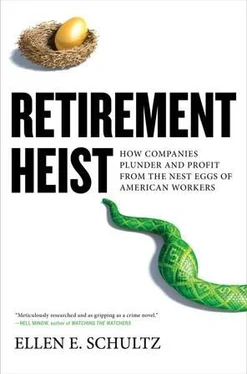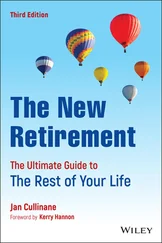In March, after another round of unanswered letters and phone calls, Loewy reached Lopez on the phone. She said she hadn’t received his letter. He re-sent it. At the end of March, when he called again, Lopez said she had received his letter, and would write back regarding his pension calculation. She didn’t.
A month later, at the end of April, Lopez called Loewy and said she’d received an actuary’s report regarding his benefits calculation and would write him within three or four days. She never wrote back.
Plan participants have a legal right to review pension documents at the company’s offices, a point noted in a booklet Motorola had distributed to employees. Inspired by this, the diminutive Loewy, clad in a three-piece, drove twenty miles from his Glendale home to Motorola’s offices in Scottsdale and asked to see the pension documents and speak to Lopez. The receptionist told him he couldn’t see any documents, and that Lopez was leaving the building for a meeting.
Loewy’s efforts were not completely in vain. The company finally responded. Shortly after his visit to the Scottsdale office, he got a letter from Frederic Singerman, a lawyer at Seyfarth Shaw, a large law firm in Washington, D.C., which represented Motorola, saying it was too late for Loewy to file a claim. Loewy had never seen a reference to a statute of limitations, so he wrote back, asking the lawyer to provide more details about the time frame for filing an appeal.
Two weeks later, Singerman replied, stating that the appeal period had expired in 1998 after Loewy first contacted the company. He added that Loewy was free to sue, but that it was too late. “Legal action on your part is no longer timely.”
The letter added that Lopez would send the plan documents for 1995 to 1998, but that Loewy’s continued efforts would be in vain. “If you are aware of other documents relevant to your claim, you will need to specify them. However, we cannot permit you to use the Plan’s offices to browse Plan records without limit in hopes of finding something ‘useful,’ and we are not aware of additional documentation that would serve to perfect your claim.”
The letter stated that Lopez “has been very cooperative and patient in explaining how your benefits were calculated and why the calculation amount was correct.” That month, Lopez was promoted to project manager and second vice president at Hewitt Associates, an outside administrator based in Lincolnshire, Illinois, to whom Motorola had outsourced the pension administration earlier in the year.
By this point, most retirees would have given up. But Loewy was tougher than he looked. His father, Elias, had run a radio shop in Alsace, France, until 1940, when his family was interned. An old business partner of his father’s, who was in charge of the local police, helped them obtain false identity papers, and the family fled to the mountains in the south, near Montpelier. A teacher whose fiancé had been killed in the First World War taught them how to pass as Catholics. Fred, then sixteen, used his chemistry skills to make shoe polish and soap, which he traded for tobacco that he swapped for food. He also helped his father harvest chestnuts and fix radios and sewing machines. In May 1943, Fred and his older brother, Max, joined an underground partisan group, Saint-Germain-de-Calberte. Fred repaired the ragtag weapons the unit cobbled together and fought in numerous skirmishes against the Germans. In August 1944, Max was killed.
After the war, Fred, his sister, and his parents resettled in the United States. Elias’s health was shattered, so they looked for someplace warm. They knew little about Phoenix, but they’d heard it needed a radio repair shop. Loewy worked in the family business until 1962, when he got a job at Motorola. He enjoyed his job as senior staff reliability engineer so much that he delayed retiring until he was almost seventy-three.
Although Motorola’s lawyer said it was futile to sue, Loewy hired a lawyer anyway. He found a good ally. There are relatively few experts on pension law who represent plaintiffs; most represent employers. One of those who did happened to practice in Phoenix. Susan Martin is not only willing to take on boggling, protracted cases against deep-pocketed adversaries, but she has a soft spot for long-shot cases involving little guys being shoved around by large Washington law firms. And she’d never had a client as organized as Loewy, who showed up with every document, letter, records of phone calls, post office receipts, and Post-it notes going back to 1998, organized chronologically.
Martin is a tenacious fighter in her own right. And having raised three teenagers, she has little patience for companies that flout the rules. Martin ascertained that the pertinent pension plan rules were contained in a 1978 pension document and asked Motorola to produce it. No response. She requested it again. No response. Martin filed a motion to compel the company to produce the document. Motorola finally complied—a year after she’d requested it. An actuary who then reviewed the pension rules determined that Motorola had failed to pay Loewy the correct amount for eight years. It owed him a total of $181,500.
Motorola didn’t agree with that conclusion. So Loewy, having “exhausted all his administrative remedies,” as they say in ERISA, was finally free to sue. The complaint, filed in federal court in Phoenix, was a class action because, as it turned out, Motorola had miscalculated the benefits of roughly five hundred other retirees who, like Loewy, had worked past age sixty-five.
In court, Motorola maintained that it had calculated Loewy’s pension correctly. Its reasoning: Just because the method it used wasn’t in the rule book, the plan didn’t actually have language forbidding the method, and thus it was allowed.
It also said it had cooperated exhaustively with Loewy, and that its benefits administrator, Hewitt, had spent 196 hours responding to Loewy’s lawyer’s document requests. In a sworn affidavit, Lopez said she had “repeatedly explained the benefits calculation and gave him plan documents.”
As his claim wended through the court, Loewy spent his time organizing and translating his records from the war years, including a eulogy that a Protestant clergyman gave in 1944 at his brother’s funeral: “Max found death in this uneven battle,” the cleric said. He fell against an adversary that had outclassed him “in number and strength of weapons.”
Sifting through old photographs of his days with the partisans, he came to a picture of Max in his school uniform before the war, and he shook his head. “I’m eighty. My days are numbered. I only hope to live long enough to see this suit completed.”
He got his wish. The judge didn’t buy Motorola’s arguments, and the company agreed to settle. If Motorola had recalculated Loewy’s pension in the first place, when he had asked for it, it would have been out a total of about $9,300. Having picked a fight with the wrong guy, Motorola now had to pay more than $11 million to more than one thousand retirees. The payments went out in 2006. Loewy died a few months later.
Chapter 12
EPITAPH
The Games Continue
JUST DAYS AFTERthe massive health care overhaul became law on March 23, 2010, large companies announced that health care reform was already costing them billions of dollars. Caterpillar was the first, announcing a $240 million hit, followed by Deere & Co., ($220 million), Verizon ($970 million), and AT&T, with the largest charge of all, $1 billion.
These statements were red meat to Fox News, where pundits concluded that this was evidence that “Obamacare” was already on its way to bankrupting the country. Former Arkansas governor Mike Huckabee, speaking on Fox Business Happy Hour, was troubled by the impact on Americans as a whole. “Whether it’s your phone bill or the cost of a tractor, the only way the companies can survive is they’re going to have to up their cost, cut their benefits, lay off employees.”
Читать дальше












